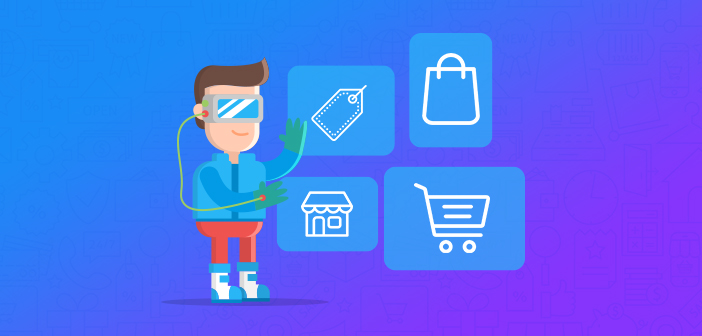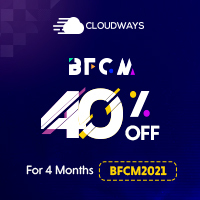5 Ways Virtual Reality Can Benefit Your Ecommerce Venture
- AbdurRahman Lakhani
- October 4, 2017

Disclaimer: Magenticians does not necessarily agree with the views expressed in this guest post. They are presented to bring to light all diverse views in the Magento and general ecommerce community.
Studies show that around 30% of companies in the Forbes 2000 list will experiment with Virtual Reality (VR) in 2017. And since a portion of these businesses have online stores, chances are that VR will be pretty big in the ecommerce sector too.
Virtual Reality is an artificial three-dimensional environment created by software. It is presented in a way that compels users to suspend their belief and believe that they are actually in another physical setting. This can have a big impact on ecommerce where experiences are pretty static and the aisles are limited to product pages.
Can introducing VR to an ecommerce venture pay off? What can we learn from current examples? Let’s find out.
1- Virtual Showrooms Can Mimic Physical Settings
According to a recent study, around 85% of consumers prefer to shop in physical stores. If you own an ecommerce venture, this can be a huge problem, but it makes sense. Online stores cannot offer the same experience that brick and mortar stores can and lack personal experience. For example, you can’t try out items like clothing. In an online store, you are ordering blindly since all you have to go by are size charts.
Lately, some brands are hoping to change this with VR. A notable example is the use of virtual reality showrooms. Consumers wander through a virtual store instead of being stuck in a static product page. And while the innovation the experience still lacks the physical sensation and smells of being in physical stores, it does come pretty close.
To illustrate, consider the VR store Buy+ launched by retail giant Alibaba. The experience allows customers to wander in virtual malls with the help of a cardboard VR headsets and their smartphones while making purchases in real time.
2- Gives Consumers Reason To Stick Around For Longer
You probably won’t abandon the shopping cart you worked so hard to fill in a store – but you probably will online. The average shopping cart abandonment rate for e-commerce is a whopping 69.23%. The reason could be anything from thinking that the price is too high or a confusing website layout. At the end of the day, it’s a sign that visitors just aren’t sticking around long enough to make a purchase.
There is so much you can do to change this, however. Even improving navigation doesn’t always guarantee that visitors will stay and maybe check out other offers. VR can change this by offering more immersive experiences like 360-degree video capabilities and interactive content.
As an example, consider IKEA’s virtual kitchen in which you can use the brand’s kitchen products to make pancakes. The experience makes you want to stay awhile, gives IKEA the chance to showcase its products and maybe make a few sales.
3- Offers Competitive Advantages
VR technologies like the one used by IKEA also teach online store owners a valuable lesson in marketing – in virtual reality, the speed to market is accelerated. This makes sense. As opposed to marketing a physical store, virtual showrooms or products are created in secrecy. Competing businesses can’t see what you are doing and try to beat you to the punch.
Additionally, VR can also help ecommerce marketers get a product ready for market before actually creating said product or getting feedback on it. This offers a huge competitive advantage and also saves on production costs.
To illustrate, consider Tesco which created a virtual reality video of a Tesco store that hadn’t opened yet. Moves like these allow business owners to analyze how plausible it would be to undertake such projects and give consumers a taste of what’s to come while keeping costs low.
4- More Personalized Experiences
Typical grocery store stocks around 40,000 products, but the average family buys a couple of hundred. People gravitate towards particular items or aisles because they are satisfied with them – but you probably won’t find two families who buy the same brand of shampoo or diapers.
Ecommerce websites optimize their product pages for keywords that their target audiences are likely to buy. In a retail store, the ideal scenario would be to spare customers from wading through products they probably won’t purchase to get to products they are. Virtual reality could be the answer. Virtual stores are already making it possible to wander through stores online. In time, customers who are provided with these experiences might give a choice to speed through the shopping process.
5- Immersive Experience Keeps Customers Focused
Mobile phones allow users to take part in several activities at once. You probably listen to music, scroll through your social media feed and perform actions, such as like or share, on the feed all in a matter of seconds.
This is what is known as sensory overload. Your senses are overstimulated and are preventing you from focusing on any one activity. Basically, you are only getting a fraction of the experience you would if you engaged in one activity individually. You also lack focus during these experiences.
Unlike mobile experiences, virtual reality experiences are completely immersive. You can’t switch from what you are currently engaged in. This keeps customers focused on YOU. When people put on a VR headset, they won’t be able to switch to another experience like they would be able to while browsing through your ecommerce website on their phone or desktop.
Wrapping Up
To recap, mimicking real experiences in VR keeps customers engaged and makes them stick around for longer. Virtual settings like showrooms make marketing cheap and offer businesses a competitive advantage. Additionally, wholly immersive experiences keep consumers focused on your brand. Keeping this in mind, it is still too soon to tell whether virtual reality has a future in ecommerce – but judging from how it is revolutionizing retail already the future looks promising.
Author Bio
Farheen Shahzeb is a copywriter at Cygnis Media a company that specializes in enterprise app development. As a tech enthusiast, she loves keeping up on the latest web development practices.



